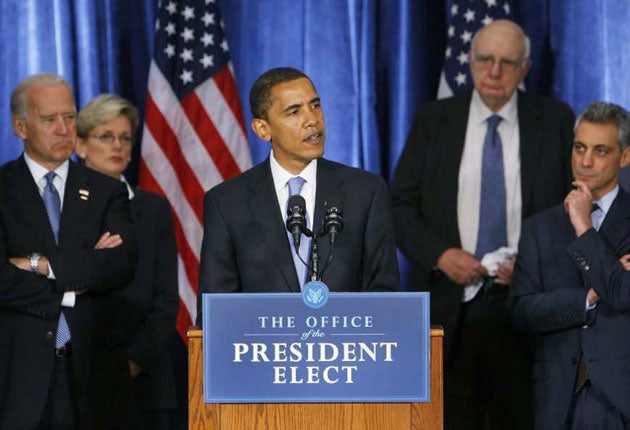Economic crisis is top priority, says Obama
President-elect promises to work with George Bush

Barack Obama said he would put plans to create jobs and re-energise the US economy at the top of his agenda and pledged to work in a "spirit of bipartisanship" with George Bush during the long handover of power.
Giving his first press conference as President-elect, flanked by members of his 17-strong economic advisory team, Mr Obama said figures showing unemployment at its highest level in 14 years proved that action was needed on day one after his inauguration – or even before. "We are facing the greatest economic challenge of our lifetime and we are going to have to act swiftly to resolve it," he added.
In particular, he piled on pressure for an economic stimulus package that could include tax cuts for working families and small businesses and extended unemployment benefits. Such a package of measures, he said, was "long overdue" and could be passed before the end of the current Congress. "If a stimulus package does not get done in the lame duck session of Congress, it will be the first thing I get done as president."
For a new president who put restoring America's economic health, protecting jobs and supporting working families at the heart of his campaign for election, unemployment could be the single most important measure of how successful Mr Obama is in pushing through his agenda.
And with foreign leaders and stock markets around the world looking for him to quickly chart a US-led course out of the global banking crisis, Mr Obama is under intense pressure to assume the reins of economic policy even while the administration of President Bush remains in situ. He is meeting Mr Bush on Monday, sooner after an election than during any previous transition, and said he expected substantial policy discussions to take place. Asked how he would react if he disagreed with Bush administration plans over the next two months, he said he did not anticipate problems and would act in a "spirit of bipartisanship".
"We have just had one of the longest election cycles in history, so I think we can put aside politics for a while and think practically about what will work."
Mr Obama faced the press for the first time since his victory after spending more than two hours in Chicago with an economics "transition team" that includes the chief executive of Google, Eric Schmidt, and – via speakerphone from Nebraska – the world's richest man, Warren Buffett. None underplayed the enormity of the task facing the new president, particularly in light of the latest economic data.
The US unemployment rate has hit 6.5 per cent, it was revealed yesterday, and the economy has shed 1.2 million jobs since the start of the year. Last month 240,000 jobs were lost, the result of the collapse in business confidence that came when the banking system froze in September.
"We didn't get into this situation in a day or a week, and we're not going to get out of it in a day or a week," said Larry Summers, a Clinton-era Treasury secretary who is among those tipped for that job under Mr Obama.
Another former Democrat Treasury secretary, Robert Rubin, also attended Mr Obama's economics session, as did Paul Volcker, a former chairman of the Federal Reserve, the US central bank.
On the agenda was how best to spend the $700bn allocated by Congress to bail out the banking system, and how to extend aid to the American car industry – whose biggest company, General Motors, is just a few months from bankruptcy, according to figures it released yesterday.
Much will depend on who Mr Obama picks as his Treasury secretary. Tim Geithner, president of the Federal Reserve Bank of New York, which has co-ordinated the central bank's rescue efforts with Wall Street, is said to be on the shortlist with Mr Summers.
Join our commenting forum
Join thought-provoking conversations, follow other Independent readers and see their replies
Comments
Bookmark popover
Removed from bookmarks